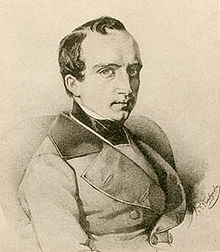- Vladimir Odoevsky
-
Vladimir Odoevsky 
Portrait by Levitsky, 1856.Born August 13, 1803
MoscowDied March 11, 1869 (aged 65)
MoscowPrince Vladimir Fyodorovich Odoevsky (Russian: Владимир Федорович Одоевский) (13 August [O.S. 1 August] 1803 – 11 March [O.S. 27 February] 1869) was a prominent Russian philosopher, writer, music critic, philanthropist and pedagogue. He became known as the "Russian Hoffmann" on account of his keen interest in fantasmagoric tales and musical criticism.
Contents
Life
The last of his family,[1] Prince Odoevsky was genealogically the most senior member of the House of Rurik. Considered by his contemporaries as a typical Muscovite, he was educated at the Nobility School of the Moscow University in 1816-22. In the mid-1820s, Odoevsky presided over the Lyubomudry Society, where he and his fellow students met to discuss the ideas of Friedrich Schelling and other German philosophers. At that period, he came to know many future Slavophiles and Westernizers, but refused to identify himself with any of these movements.
Since 1824, Odoevsky was active as a literary critic and journalist. In 1824 he and Wilhelm Küchelbecker founded the short-lived Moscow literary magazine Mnemozina. Perhaps most famously, he co-edited the Sovremennik with Alexander Pushkin in the mid-1830s. In 1826, he moved to St Petersburg, where he joined the staff of the Imperial Public Library. Two decades later, he was put in charge of the Rumyantsev Museum. Odoevsky finally returned to Moscow in 1861 but continued to serve as a senator until his death. He is buried in the Donskoy monastery necropolis.
Short stories
Aspiring to imitate Ludwig Tieck and Novalis, Odoevsky published a number of tales for children (e.g., "The Snuff-Box Town") and fantastical stories for adults (e.g., "Cosmorama" and "Salamandra") imbued with the vague mysticism in the vein of Jakob Boehme and Louis-Claude de Saint-Martin.
Following the success of Pushkin's The Queen of Spades, Odoevsky wrote a number of similar stories on the dissipated life of the Russian aristocracy (e.g., Princess Mimi and Princess Zizi). On account of his many short stories from the 1820s and 1830s, Odoevsky should be listed among the pioneers of the impressionistic short story in Europe.
His most mature book was the collection of essays and novellas entitled The Russian Nights (1844). Loosely patterned after the Noctes Atticae, the book took two decades to complete. It contains some of Odoevsky's best known fiction, including the dystopian novellas The Last Suicide and The Town with No Name. The stories are interlaced with philosophic conversations redolent of the French Encyclopedists.
Musical criticism
As a music critic, Odoevsky set out to propagate the national style of Mikhail Glinka and his followers. Among his many articles on musical subjects, a treatise about old Russian church singing deserves particular attention. Johann Sebastian Bach and Beethoven appear as characters in some of his novellas. Odoevsky was active in the foundation of the Russian Musical Society, Moscow Conservatory, and St. Petersburg Conservatory.
Technology
Odoyevsky took part in development of the electroplating technology, invented by Moritz von Jacobi in Russia. In 1844 Odoyevsky wrote a book Galvanism applied in technology (Гальванизм в техническом применении). He made a number of experiments and developed cobalt electroplating.[1]
Utopia
Recently, Odoevsky has been credited to have predicted blogging, and the basic principles of the Internet. In his unfinished utopian novel Year 4338 (fragments published 1835 and 1840; the whole manuscript 1926), he mused:
Finally, today we received a household journal from the prime minister, where we, among others, were invited to a soiree. You need to know that in many houses, especially those well connected, such journals are published, having replaced regular correspondence. . . . The journals usually provide information about the hosts’ good or bad health, family news, various thoughts and comments, small inventions, as well as invitations; in case of a dinner invitation, also the menu. Besides, for communicating in emergency, friends' houses are connected by means of magnetic telegraphs that allow people who live far from each other to talk to each other.
Works
- Zhivoi mertvets, 1844 (The Living Corpse)
English Translations
- Princess Mimi, The Sylph, and The Live Corpse, (Stories), from Russian Romantic Prose: An Anthology, Translation Press, 1979.
- Two Princesses, (Novel), Hesperus Press, 2010.
References
External links
Categories:- 1803 births
- 1869 deaths
- People from Moscow
- Rurikids
- Russian philosophers
- Russian art critics
- Russian music critics
- Russian short story writers
- Russian science fiction writers
- Russian inventors
- Russian philanthropists
Wikimedia Foundation. 2010.

